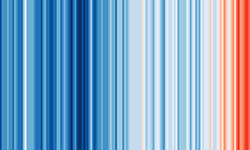#madeatreading: Reading leading the fight against environmental threats
Monday, 17 June 2019

A celebration of world-leading research into some of the biggest environmental threats facing the world is taking place all week at the University of Reading.
The work of Reading scientists in areas like flood forecasting, pollinator protection and climate change is being highlighted in the #madeatreading campaign, backed by Universities UK, from 17-21 June.
The week will culminate with ‘Show Your Stripes Day’ on Friday 21 June, during which members of the public can help raise awareness of climate change by sharing a graphic showing how temperatures around the world have risen since 1850. People can visit showyourstripes.info to generate a climate stripes graphics tailored to where they live and share it on the day in support of climate science.
As well as environment research stories, the University will share action it has taken to reduce its own carbon footprint, and how it is working with the Thames Valley region to bring about positive changes.
Professor Robert Van de Noort, Vice-Chancellor of the University of Reading, said: “A passion for the environment and sustainability runs right through the heart of this university. This is reflected in the world class research carried out by our talented academics and the decisions made on campus to reduce our own impact on the planet.
“We are actively exploring how we can make the University of Reading a carbon neutral institution. This will be challenging, but it is a responsible course of action that is backed by our students and staff, and will be of huge benefit to future generations.”
The focus on Monday is on climate science research and environmental threats facing humans, in which Reading is a major international player. The University’s Department of Meteorology is one of the best in the world – ranked second in the world in 2017 by the Center for World University Rankings.
Researchers are seeking to forecast how greenhouse gas emissions are affecting the world’s climate and how climate change will impact our lives. This includes:
- defining the ‘pre-industrial’ times baseline, from which temperature rise targets are measured from in international agreements on climate change action such as the Paris Agreement.
- work on forecasting air turbulence, which causes hundreds of injuries on aeroplanes every year, has revealed it is set to rise by up to three times due to climate change later this century. It has led to work with Airbus to improve aircraft designs.
- flooding experts at Reading provided reports with the latest forecasts to the UK government to guide action ahead of recent Cyclones Idai and Kenneth in East Africa. This is part of a large project aiming to improve flood forecasting to enable early warnings for governments and humanitarian partners around the world, which could save lives.
- work at the Walker Institute and Centre for Climate and Justice looks at how the developing world is disproportionally affected by climate change, how science can support farmers and how countries can encourage green growth. The University’s TAMSAT programme is also providing early warning of potential food shortages in Africa by observing weather patterns likely to result in low crop yields, benefitting hundreds of millions of people in the continent.
- a project rebuilding cocoa farming in Dominica following Hurricane Maria in 2017.
- NERC-funded research is seeking to coordinate national public engagement with environmental research, including citizen science projects.
- helping island states like Mauritius and St Lucia to use satellite and in-situ weather data from Reading’s Institute for Environmental Analytics (IEA) to switch from fossil fuels to renewable energy.
The #madeatreading campaign week follows Reading research into protecting cocoa farming and developing a new treatment for childhood depression being profiled as part of the national Universities UK #madeatuni campaign.
Follow activities throughout the week on Twitter, Facebook and Instagram, and join the discussion using the hashtag #madeatreading
